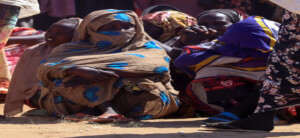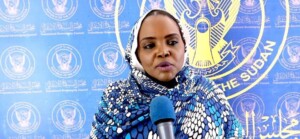Imams denounce ‘corrupt practices’ of Sudanese Minister of Finance
In sermons during Friday prayers in Khartoum last week, imams of mosques strongly criticised Finance Minister Jibril Ibrahim for exempting his nephew from paying customs fees for a new car.
The Muslim preachers considered this corrupted practice “a breach of the balance of justice in the country”.
 Sheikh Adam Ibrahim El Sheen (Social media)
Sheikh Adam Ibrahim El Sheen (Social media)
In sermons during Friday prayers in Khartoum last week, imams of mosques strongly criticised Finance Minister Jibril Ibrahim for exempting his nephew from paying customs fees for a new car.
The Muslim preachers considered this corrupted practice “a breach of the balance of justice in the country”.
Videos and excepts of the sermons of well-known Sheikh Adam Ibrahim and Sheikh Mahran Mahir were posted on social media.
“They are lying in the name of religion,” Sheikh Ibrahim stated angrily. The Finance Minister is telling “the poor Sudanese population that they should depend on and support themselves. [..]
“He is giving the son of his brother the right to be excluded from customs fees, while at the same time he is barring the others from any rights. [..] “Where is his superior? Why do you keep silent on this corruption he is spreading? Or is he backed? He has forces. He has weapons. Don’t you fear God?” he asked.
Sheikh Mahran spoke about sheer injustice, and quoted the Prophet Mohamed who said that any leader should be held accountable for his deeds.
The sermons found a wide response among large sectors of society, El Intibaha newspaper wrote. Many people required the Minister of Finance to be held accountable.
Jibril Ibrahim, the leader of the Darfuri rebel Justice and Equality Movement, was appointed in February last year by former PM Abdallah Hamdok as Minister of Finance, following the signing of the Juba Peace Agreement in October 2020 between the Sudanese government and the Sudan Revolutionary Front alliance of a number of rebel groups in the country.
Following the coup d’état of October 25 last year, Hamdok and most of his ministers resigned, but Ibrahim and the ministers of Interior Affairs and Defence, both army generals, remained in their positions. Other rebel leaders who were appointed as members of the Sovereignty Council as well stayed put.
Radio Dabanga reported end August that Ibrahim expects the country’s budget for 2023, like the current year’s budget, to be devoid of international support. He said that industrial mining and agricultural production should be increased for Sudan to become self-sufficient in the future.
A month earlier, he said he expects large profits from the export of gold this year.
Many Sudanese are suffering from malnutrition and hunger. This month up to 40 per cent of Sudanese may slip into food insecurity, UN agencies warned.











 and then
and then